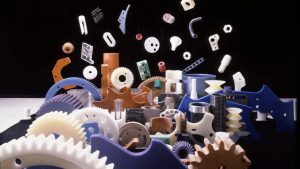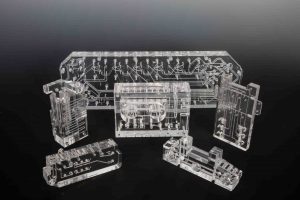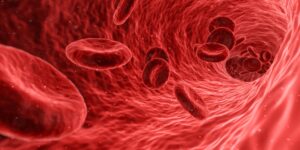The Advantages of Plastics in Modern Industries
A versatile alternative
Plastics offer a wide range of benefits across many industries. From improved design flexibility to reduced cost and enhanced performance, this versatile family of polymers hosts an abundance of desirable qualities that make it attractive to industry leaders from aerospace and automotive sectors to electronics, medical, and biological research applications. Possessing superb chemical and temperature resistance, high strength-to-weight ratio, and a lightweight nature, machined plastics are an enticing alternative to modern contemporaries like steel. Easily customizable and highly precise, plastics provide significant advantages in terms of weight reduction, resistance, and when properly machined, boosts to overall performance.
Weight Reduction
Automotive
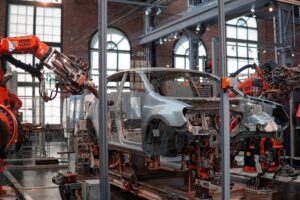
Machined plastics are lighter than their steel counterparts, and this is highly advantageous in applications where weight is a concern. In the automotive industry, plastic components are used in both interior and exterior applications ranging from aesthetic functionality to mechanical. On the mechanical side, one of the major uses for plastics is in fluidics. Plastic manifolds are commonly used to regulate the flow of fluids throughout vehicles, and they provide several benefits over steel, including notable reductions in weight. Today, these parts are seeing ever more frequent use in engine, transmission, hydraulic, and cooling systems. The benefits of these parts reduce overall vehicle weight and make for more efficient fuel economy.

Aerospace
In the aerospace industry, these same benefits have a significant impact on aircraft performance and longevity. Using a Gulfstream IV for this example, FAA research has shown that a roughly 1% reduction in aircraft weight can result in nearly fifty gallons of fuel saved over a thousand nautical miles of flight. Reductions in weight also lead to improvements in aircraft maneuverability. This means less wear and tear on components, lower risk of accidents or incidents requiring repairs, and a reduction of structural fatigue, all of which lead to lowered maintenance costs. In the space industry specifically, where fuel itself is a payload, and weight is at a premium, these benefits cannot be overstated.
A Lightweight and Reliable Resource
The upside of weight reduction extends into other industries as well, and to this end, machined plastics are used in medical devices, consumer electronics, defense and military applications, and industrial machinery, among others. Overall, plastic components improve performance, mitigate the risk of some safety concerns, and reduce operating costs.
Temperature and Chemical Resistance
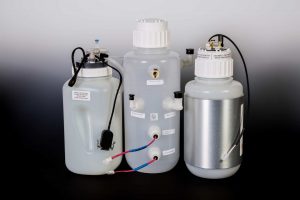
Many high performance plastics are naturally resistant to extremes of both temperature and chemical influences. While steel excels strictly in terms of temperature tolerance, it is this combination of resistances that make plastics highly attractive to industries around the world. PEEK, ULTEM, and PPS are prime examples of this. For example, each of these thermoplastics can withstand continuous temperatures ranging from 340°F (Ultem) to 480°F (PEEK). They each exhibit impressive resiliency on the chemistry side of things as well.
PEEK
PEEK has a low moisture absorption rate, and maintains physical integrity in applications where hot water or steam are present. It is resistant to biodegradation, and is compatible with nearly any solvent used in HPLC. Combined, PEEK’s impressive strength and ability to withstand harsh environments make it a sought after workhorse for aircraft components, pumps, bearings, and medical implants.
ULTEM
ULTEM boasts qualities similar to PEEK, though it has lower impact strength and safe use temperatures than its more robust cousin. This is good news for companies that don’t need something quite so hardy as PEEK, because ULTEM is accompanied by a lower price tag. ULTEM is often sought after for use in medical and chemical instrumentation.
PPS
PPS shines in terms of chemical and moist-heat resistance, as well as its ability to retain dimensional stability in demanding chemical and temperature environments. It is resistant to acids, alkalies, bleaches, sunlight, and mildew, among other stressors, and it has no known organic solvent under 392°F. It is also inherently flame-retardant, as it has a tendency to char during combustion. These qualities make PPS a popular option for car parts and electrical components.
A World of Options
PEEK, ULTEM, and PPS are just a few examples of high-end plastics that see regular use today. Many other plastics offer unique and valuable advantages in terms of resistance, and these qualities make plastics a top choice for modern industries. Try Piedmont CMG’s selection guide to find the right material for your industry goals.
Machinability and Repeatability
Among the major benefits of CNC machined plastics is the machining itself. Plastics take well to being cut into complex geometries without suffering degradation of structural integrity. Precision is crucial, and the accuracy of CAD automation allows for complex designs and shapes that would be impossible to achieve via other methods. This is a valued quality in industries such as aerospace, automotive, and medical, where intricate, highly customized parts are required for an array of applications.
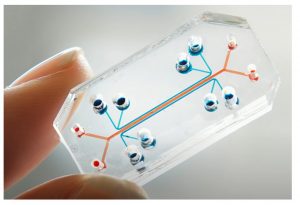
The ability to meet exacting technical specifications allows CNC machine shops to produce parts with tight tolerances, and allows for precise customization of shape, size, and surface finish. These same properties make CNC machined plastics an attractive option in terms of flexibility, design freedom, and in manufacturing unique geometries. In addition, CAD software is capable of extremely high levels of repeatability, and manufacturers of CNC machined parts have the ability to consistently reproduce a given part to precise specifications over multiple production runs. Together, the strengths of CNC machining reduce costs by reducing errors, minimizing waste, and increasing production efficiency.
The Bottom Line
The advantages of plastics in modern industries are vast, significant, and easily identifiable. From weight reduction and improved performance to chemical and temperature resistance, machined plastics are often sought after as an alternative to steel and other traditional industry materials. With the ability to be machined into complex geometries while maintaining structural integrity, plastics offer precision and repeatability that allow for highly customized parts and efficient production runs. Be it aerospace, automotive, medical, or other industries, the benefits of plastics make them a sought-after option for achieving industry goals. To learn more about the right material for your specific industry needs, speak with the experts at Piedmont CMG.
Bibliography:
“Regulations and Policies,” Federal Aviation Administration, 01 November, 2022, https://www.faa.gov/regulations_policies
“Composites in Cars: Making Vehicles Lighter, Safer, and More Fuel-Efficient,” The University of Utah, 29 September, 2012, https://www.mech.utah.edu/composites_cars/
Joyce, James W., “Fluidics: Basic Components and Applications,” Defense Technical Information Center, 01 August, 1983, https://apps.dtic.mil/sti/citations/ADA134046

